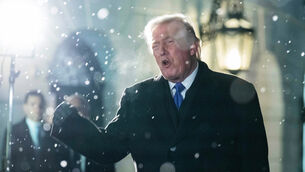Blair affirms belief in Saddam’s weapons
US Defence Secretary Donald Rumsfeld claimed last night the weapons may have been destroyed by the Iraqis before the war broke out.
But Mr Blair, speaking to journalists on board his chartered aircraft as he headed for Kuwait, insisted: "I have said throughout and I just repeat to you, I have absolutely no doubt at all about the existence of weapons of mass destruction.














